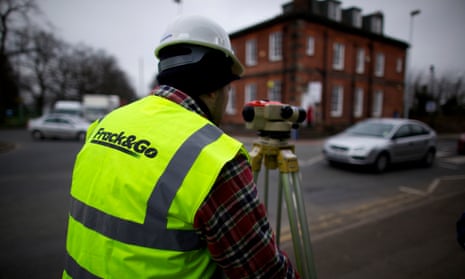A heavily-redacted government report on the impacts of fracking on house prices, businesses and services in rural areas must be published in full, the UK’s information commissioner has ruled.
The report was released in July 2014 in response to a freedom of information request from Greenpeace but with 78 redactions, including 16 in the conclusion chapter.
The information commissioner upheld Greenpeace’s appeal against these redactions on Thursday: “There is a strong public interest in understanding the full detail of the research that has been carried out and how it has been considered.”
The Department for Environment, Food and Rural Affairs must now publish the report within 35 days or mount its own appeal. A spokeswoman said: “The Information Commissioner’s Office informed us of his decision which we will now consider in full.”
The development comes at a sensitive time as the go-ahead for the country’s first full scale shale gas drilling could be given next week. Lancashire county council (LCC) will vote on applications from fracking company Cuadrilla to drill up to four wells at each of two sites on the Fylde.
LCC’s planning officials recommended on Monday that one site is approved but that the other is rejected on the basis of the “severe” impact on road safety caused by heavy lorries.
“The government’s stubborn refusal to publish this report in full is totally indefensible,” said Daisy Sands, Greenpeace UK energy and climate campaigner. “By cherry-picking which evidence is released, ministers are misleading both the public and local councillors as to the real impacts of fracking.”
“LCC is about to make a decision that will have huge repercussions for the life of their communities. They should have access to all the evidence, not just the sanitised digest produced by the government,” said Sands.
At the time of the redacted report’s release in 2014 a government spokesman said: “There is no evidence that house prices have been affected in over half a century of oil and gas exploration in the UK or evidence that this would be the case with shale.”
A survey of estate agents commissioned by Greenpeace in April 2015 suggested fracking could wipe thousands of pounds off the value of homes
David Cameron has said the government is “going all out” for fracking, claiming it would create jobs and cut the country’s reliance on gas imports. But opponents argue it risks health and environmental impacts and undermines efforts to tackle climate change.
A moratorium on fracking has been declared in Scotland and the Welsh assembly has indicated it would like to do the same. The European parliament voted for a fracking moratorium on 10 June, although the vote ended up being largely symbolic.

Comments (…)
Sign in or create your Guardian account to join the discussion